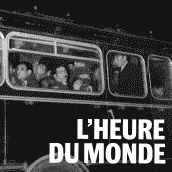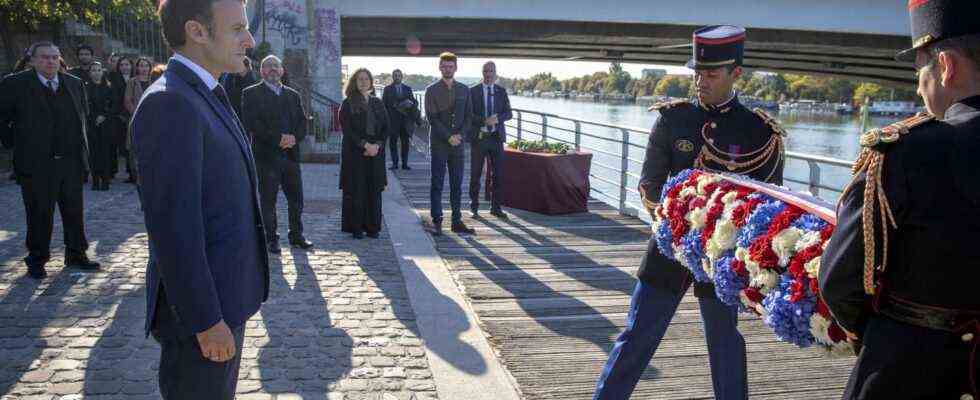Sixty years later, Emmanuel Macron commemorated, Saturday, October 16, the bloody night of October 17, 1961, during which at least 120 Algerians were killed by French police during a demonstration in Paris.
The head of state “Admitted the facts: the crimes committed that night under the authority of Maurice Papon are inexcusable for the Republic”, underlined a press release from the Elysee.
“The repression was brutal, violent, bloody. Nearly 12,000 Algerians were arrested and transferred to sorting centers at the Pierre-de-Coubertin stadium, the Palais des sports and other places. In addition to many wounded, several dozen were killed, their bodies thrown into the Seine. Many families have never found the remains of their loved ones, who disappeared that night. The President of the Republic pays tribute to the memory of all the victims. “
An unprecedented gesture for a French president, Mr. Macron participated in a tribute on the banks of the Seine, at the height of the Bezons bridge. This bridge was taken sixty years ago by Algerian demonstrators who arrived from the neighboring slum of Nanterre at the appeal of the branch of the National Liberation Front (FLN) installed in France. The president went to lay a wreath, then observed a minute of silence, before speaking with relatives of the victims. He did not, however, make a speech.
In the press release issued by the Elysee Palace, it is mentioned that “France looks at its entire history with lucidity and recognizes the clearly established responsibilities. It owes it first and foremost to itself, to all those whom the Algerian war and its procession of crimes committed on all sides have wounded in their flesh and in their soul ”. In 2012, Mr. Macron’s predecessor, François Hollande, had, him, evoked a “bloody repression”, in a press release.
“Insufficient” words according to activists
Activists regretted that the president had “Played on words” without actually recognizing, as they ask, a “State crime”. That Mr. Macron denounces “Inexcusable crimes” perpetrated that night against these Algerians who came to demonstrate peacefully in the capital against a curfew ” is not enough “, lamented Rahim Rezigat, 81, formerly of the French Federation of the FLN.
Mr. Macron “Plays on words in relation to its electorate, including those nostalgic for French Algeria”, estimated this activist during debates organized in Paris by SOS-Racisme and bringing together activists from this bloody page in the history of France and young people from Ile-de-France.
For his part, Dominique Sopo, the president of SOS-Racisme, stressed to Agence France-Presse “Welcome advances”, while regretting “Emmanuel Macron’s reluctance” and his “Small steps policy”.
“The Head of State goes further than [François] Hollande in the precision of the facts, but without naming colonialism ”, and also the “Crime is reduced to the responsibility of Maurice Papon. It was not a state within a state ”, believes the association leader, “There was indeed a head of government and a head of state who decided who was the prefect of police. Papon remained in office until 1967 “, recalled Mr. Sopo.
The words of the Elysée are “A step forward, but it is still partial. We hoped for more. Papon did not act alone. We tortured, we massacred in the heart of Paris and, up there, they knew about it ”, reacted for his part Mimouna Hadjam, spokesperson for the association Africa 93 which also claims the “Recognition of a state crime”.
Tense context
After the delivery of the report by historian Benjamin Stora on the colonization and the Algerian war (1954-1962), in January, the Head of State undertook to participate “Three commemorative and emblematic days” : the premiere took place around September 25, national day of homage to the harkis and the second this Saturday. The third will be on March 19 for the 60th anniversary of the Evian accords, which ended the war in Algeria. “France must recognize this tragedy as an inexcusable tragedy, as a kind of crime which has been decided”, had estimated a little earlier, on Saturday, Benjamin Stora on Europe 1 and Cnews. “There is a responsibility of the State under the authority of Maurice Papon”, Paris police prefect from 1958 to 1967.
This ceremony took place in a tense context between Paris and Algiers, after remarks by Mr. Macron reported by The world, October 2. The French president blamed the system “Politico-military” Algerian to maintain a “Memorial rent” by serving his people a “Official story” who “Does not rely on truths”.
“Whatever the state of our relations with Algeria and whatever the positions of the Algerian authorities on the issue, we are doing it for ourselves, not for Franco-Algerian reasons”, we assure at the Elysee.
The Head of State, who has undertaken an unprecedented work of memory on the Algerian war, wishes above all “Look history in the face”, as it did in Rwanda by recognizing the “Responsibilities” from France in the 1994 Tutsi genocide. “But that doesn’t mean rewriting history or reinventing it”, warns the Elysee.
“The President of the Republic has decided to lead this memorial battle in a methodical and organized manner. There was Maurice Audin, Ali Boumendjel, forgiveness for the harkis… We have made more progress on the memorial site in a few months than in sixty years ”, assures Mr. Stora.

Also listen Massacre of October 17, 1961: the end of a long silence?

